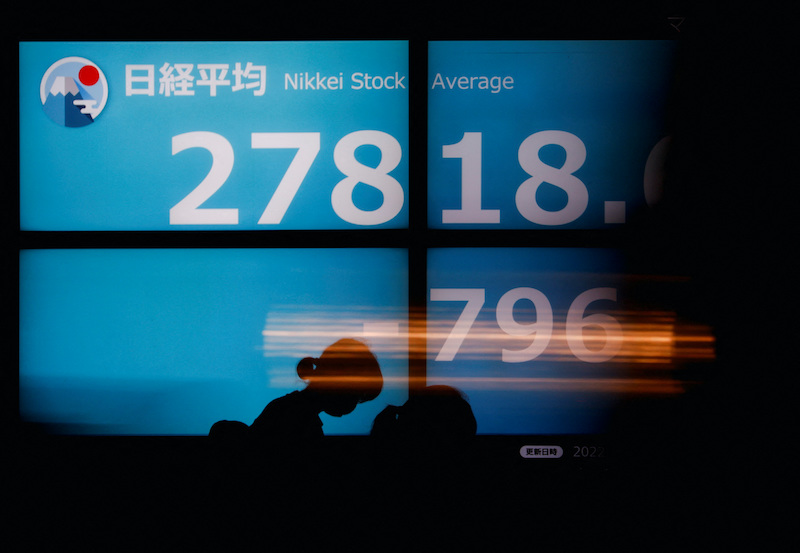Asian stocks rallied on Friday as investors tried to put a positive shine on what has been a turbulent year on trading floors.
Traders were buoyed by US data showing the Federal Reserve’s aggressive monetary policy was dampening inflationary pressures, even as worries over Covid cases in China persist.
But while MSCI’s broadest index of Asia-Pacific shares outside Japan rose 0.71%, it was set to end the year down 19% – its worst performance since 2008.
Also on AF: Taiwan’s TSMC Starts Production of Its Most Advanced Chip Yet
And Japan’s Nikkei index gave up early gains to end flat ahead of the New Year holidays, posting its first yearly loss in four years.
The Nikkei closed flat at 26,094.50, after rising as much as 0.9% earlier in the session driven by overnight gains on Wall Street. The index dropped 9.4% for the year, its first loss since 2018.
The broader Topix reversed course to end 0.19% lower at 1,891.71, falling 5% for the year, its first loss in four years as well.
“Investors are worried there may be something happening in the US during the holiday. There are many uncertainties in overseas markets,” said Shoichi Arisawa, general manager of the investment research department at IwaiCosmo Securities.
China’s blue-chip CSI 300 Index and the Shanghai Composite Index were both up while Hong Kong’s Hang Seng Index edged ahead too.
That came after Chinese leaders pledged to implement more policy adjustments to cushion the impact on businesses and consumers from a surge in Covid-19 infections.
The world’s second-largest economy is expected to suffer a slowdown in factory output and consumption in the near-term as workers and shoppers fall ill.
China’s health system has been under stress due to soaring cases since the country started dismantling its ‘zero-Covid’ policy at the start of the month, with several countries imposing or considering imposing curbs on travellers from China.
The Shanghai Composite Index advanced 0.51%, or 15.56 points, to 3,089.26, while the Shenzhen Composite Index on China’s second exchange was up 0.37%, or 7.21 points, to 1,975.61.
The Hang Seng Index rose 0.20%, or 40.27 points, to 19,781.41.
Elsewhere across the region, Australia’s S&P/ASX 200 index closed up 0.5%. Indian stocks dropped with Mumbai’s signature Nifty 50 index down 0.47%, or 85.70 points, to close at 18,105.30.
Inflation Worries Persist
Globally, futures indicated European stocks were unlikely to retain the end-of-year cheer, with the Eurostoxx 50 futures down 0.16%, German DAX futures 0.13% lower and FTSE futures down 0.01%. E-mini futures for the S&P 500 fell 0.10%.
Investors have been worried that central banks’ efforts to tame inflation could lead to an economic slowdown, while the uncertainty over how swiftly China’s economy will recover in the wake of removal of Covid controls has kept markets subdued.
“Averting a downturn is a tall order,” said Vishnu Varathan, head of economics and strategy at Mizuho Bank, noting that the odds are stacked against economies emerging unscathed from global policy tightening.
Going into 2023, inflation has still to be beaten and investors will also be wary of geo-political tensions arising from Russia’s war in Ukraine and diplomatic strains over Taiwan, analysts said.
US stocks closed sharply higher overnight, buoyed by data showing rising US jobless claims, which suggested the Fed’s interest rate hikes might be starting to cool labour demand in its fight against inflation.
In the currency market, the US dollar was on track for its best annual performance in seven years. The dollar index, which measures the greenback against six major currencies, fell 0.01% on Friday, but entering the 2022’s final few hours of trading, it had gained nearly 9% over the year.
The Japanese yen strengthened 0.25% versus the greenback at 132.64 per dollar. The euro was down 0.02% to $1.0659.
US crude rose 0.23% to $78.58 per barrel and Brent was at $83.61, up 0.18% on the day.
Though way off the peaks seen earlier this year, Brent was still set to close 2022 with a 5.76% gain after rising 50.2% in 2021, while West Texas Intermediate was on track for a 4.5% rise in 2022 following a 55% gain last year.
Key figures
Tokyo – Nikkei 225 > UP 0.01% at 26,094.50 (close)
Hong Kong – Hang Seng Index > UP 0.20% at 19,781.41 (close)
Shanghai – Composite > UP 0.51% at 3,089.26 (close)
London – FTSE 100 < DOWN 0.27% at 7,492.54 (1050 GMT)
New York – Dow > UP 1.05% at 33,220.80 (Thursday close)
- Reuters with additional editing by Sean O’Meara
Read more:
China’s Yuan on Course for Biggest Annual Loss in 28 Years
Chinese Hospitals Flooded With Elderly Covid Patients
























